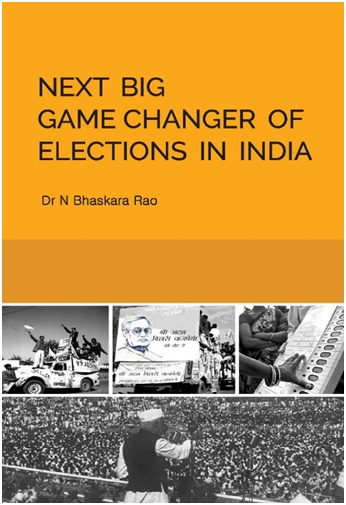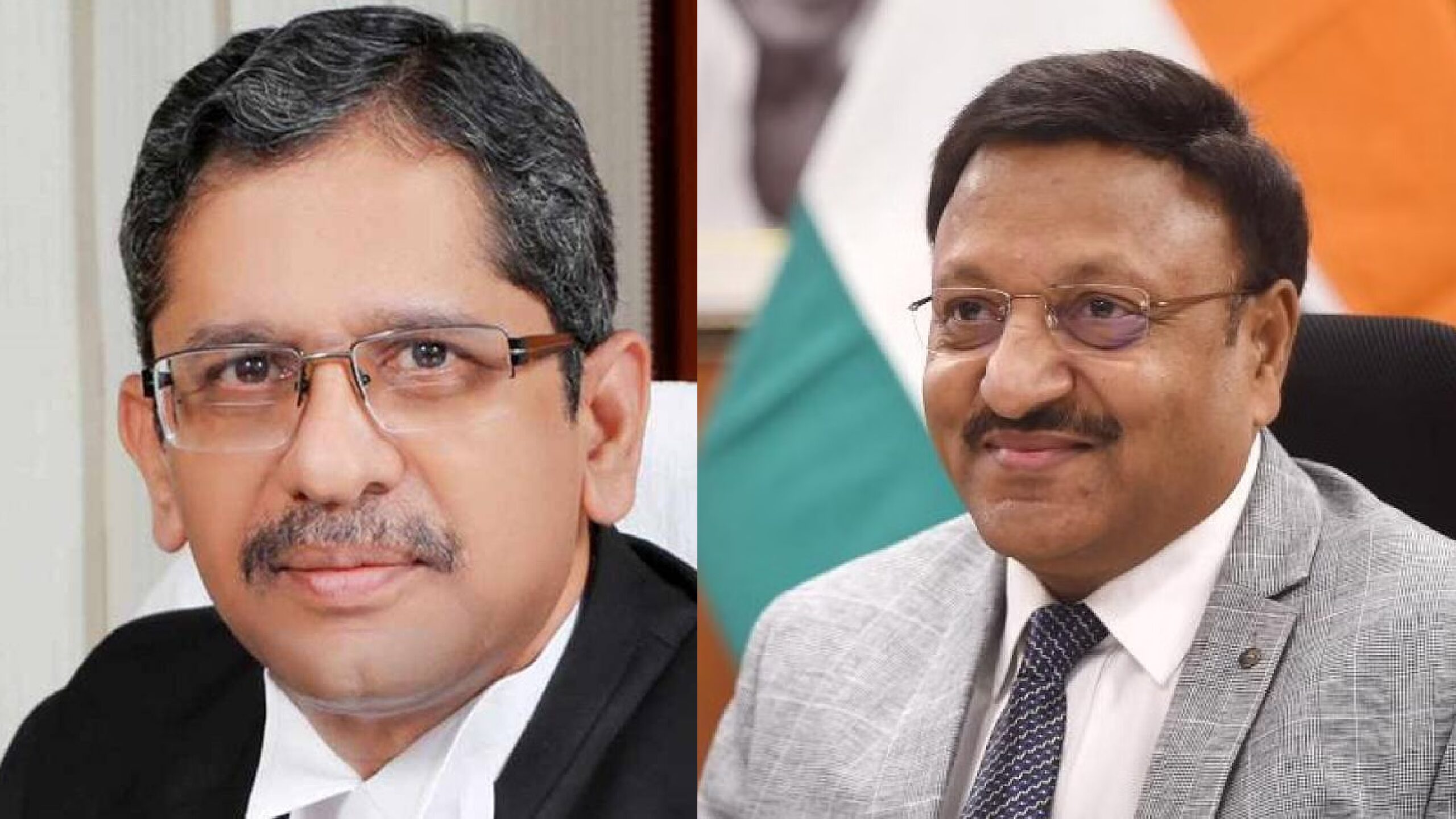CJI NV Ramana, CEC Rajiv Kumar
Last fortnight the Prime Minister and Chief Justice of India both expressed concern about poll time freebies. The context of their concern was of course different. But they need to be viewed together so that we do not continue to preoccupy with symptoms and lose sight of the larger issue. PM Narendra Modi questioned (in UP and Jharkhand) in two different meetings of “mindless promises of politicians in pursuit of votes”. He even termed that as some kind of a sweet dish, Revari. He also said that it is very easy to make “populist promises”. (but difficult to fulfil—this, of course, he was not explicit).
Also read: Is education bewildering?
CJI’s concern
Chief Justine of India N V Ramana’s concern came out a fortnight ago, when the bench led by him on freebies observed that “irrational poll promises” be curbed. The bench wanted the Finance Commission to explore “if there are any ways to curb political parties” from promising and distributing “irrational freebies.” But on Tuesday (August 3), the bench suggested that a committee comprising RBI, ECI, NITI Aayog, Finance Commission and political parties be setup to come up with suggestions, “thereafter it (SC) will set up a body to address the issues.” it is so obvious that SC too has taken a deroute on freebies. The bench did not even remind and retreat the mandate of ECI but, on the other, rejected the idea of directing ECI take punitive action of violators. ECI, on its part, chose hands off approach once again on freebies instead of availing it as an opportunity to uphold itself. The Supreme Court missed to reiterate checks and balances provision. Instead it contended that ECI cannot regulate state policies and decisions taken by the winning party.
Also read: What happened to “little Republics” of India of yesteryear? They need a voice, urgently!
To conduct elections for Assemblies and Parliament “free and fairly” and “independently”, is an Election Commission’s responsibility. There is no ambiguity about it. The government could decide about certain modalities of conducting the elections like the number of constituencies, voting age, and the like. But whether the government of the day could take decisions even when it is known and acknowledged that those decisions (as in the case of electoral bonds, for example) vitiate free and fairness of polls? This ambiguity is kept alive as if deliberately every time the matter goes to a Court.
Also read: When Can We Expect Checks & Balances Between the Executive, Legislature & Judiciary?
What is ‘free and fair?’
While there cannot be any confusion about independence of the ECI, there can be question as to what is “free and fair”. It is for the ECI to choose ways as it did at the outset by availing political parties to contest elections although there was no such provision in the constitutionas a right of parties. ECI issued the idea of Election Symbols Order considering the conditions prevailed so that illiteracy will not come in the way of fair voting. It even had come up with ceiling on the expenditure that candidates could spend for seeking votes and campaign. Similarly, the ECI came up with Code of Conduct for those contesting the elections and for campaigns. The idea of code was also endorsed by the Supreme Court years ago. Two years ago Madras High Court had even asked the ECI to curb the menace of freebies vitiating the electoral process. Freebies include earlier doles to voters directly before the voting. This task of conducting elections is to choose “peoples representative” by a simple majority. Elections are for choosing peoples representative, not of political parties. Can there be any doubt about it?
This challenge got complicated and become complex in recent years with four inter linked developments each adding to the expenditure and compulsions of wooing voters to win the poll. These are to do with the functioning of the ECI. Second, determining representativeness for eligibility to contest. Third, the incumbent party in government using the powers of the state to its advantage and to the disadvantage of the opposing candidates or parties, which obviously means framing and using rules and laws to its advantage and, fourth, luring voters with all kind of promises in the name of propositions in a poll manifesto as the basis for seeking votes, and even using money and manipulative power to lure voters. That these have become a phenomenon is well revealed reliably even by ECI itself (Via ADR).
Also read: Do we expect any better Environment?
Fly out by night
But now we see a new model gaining, a guaranteed one to power, emerging where a party need not bother about directly wooing voter or pampering cadre or even cajoling the ECI as sitting legislators themselves are wooed. Earlier, parties and leaders compromised with increase in expenditure and even direct dolls to voters, but with performance of elected reps and the Governments coming under questioning from voters, “freebies modus” was found much easier without much responsibility. But now with freebies destabilising economies and public criticism across states, a new easy to power model is found. This model “fly out” of sitting legislators could even be overnight affair as we are witnessing recently. Four states had witnessed in a matter of 2-3 years. We are now in this third stage of “power game” where one need not even bother about representative character of candidates to people or wooing voters directly or indirectly. I know for sure that all these three models of wooing and manipulation of the process of “capturing” power will be relied simultaneously. This is a new complexity or reality vitiating the very process of choosing peoples representative Government.
Also read: Biographies could change future of a generation!

Electoral bonds
Two decades ago CMS had tracked as an early warning how money was being spent by candidates and parties for poll campaign and directly as dole. Since CMS has been bringing out how that money, both what is officially claimed by candidates and otherwise, has been going up election to election to reach today’s high point which works out in all more than what is spent to elect an American President. This expenditure has multiplied as the dole practice of distributing cash and gifts to voters has become a routine in elections. On the contrary, with electoral bonds for pumping more unaccounted money and increase in ceiling on campaign expenditure even when most candidates themselves formally claimed that they had spent much less than the ceiling amount has formalised that practice. These have added to the compulsions for freebies. Electoral Bonds were pushed through despite opposition even of RBI and of ECI initially. Then RBI Governor, Urjit Patel, reminded that such bonds promote money laundering. ECI, of course, had backtracked later. A recent realisation by leaders that unfulfilling of poll promises causes voters’ resentment and to cope with that, more freebies have to be offered with new ones each time. This is also because of decline in fiscal responsibility of governments and unconcern of political leaders. This has increased the borrowings of Governments to new heights. These have made parties to come up with freebies as more attractive way of wooing voters and gaining instant popularity. Former Governor of RBI, D. Subba Rao recently wrote about havoc that poll freebies meant to fiscal discipline of the country. While ECI has become insensitive, even the Supreme Court has now become so. What else explains SC not coming up with verdict keeping it pending for months on the case against poll bonds?
Also read: No holds barred opportunity to an individual channel to excel…
The three phenomena
With that trend of money disbursement reaching peak, poll promises have gained and become competitive poll to poll and between contesting parties to threaten the physical responsibility of governments and even the budgetary provisions. Political parties are now finding much easier ways of “coming to power” irrespective of the poll was free or fair or even what the outcome was at the poll.

The basic issue is how we could elect true representatives of people, independently, freely and fairly. Have we explored ways of such elections where neither doles to individual voters need to be higher and higher nor the parties need to offer a moon to voters once elected as if they need not bother about implications? The ECI cannot buckle itself as it claimed now at the Supreme Court once again. What stops it from taking initiatives including preventing violators from contesting, or set up checks and balance arrangement with independent eminent names as officials are made as observers. ECI could declare a candidate or even violating legislator disqualified from contesting next two around for violating an election code or a poll verdict. I made some suggestions in my book, “Next Big Game Changer of Elections in India.” ECI could change the present order, but it chooses otherwise. It needs to stand up in dealing with the manners of party in government as well as the big bosses in the government. The Supreme Court on its part should be consistent and unambiguous in its role in ensuring polls are held free and fairly and independently as provided in the constitution.
The three phenomena of vitiating the reliability of electoral system need to be addressed together. The connectivity need to be understood. That is between “poll expenditure”, “freebies” and now “fly (legislators) by night” operations. Such a discussion is being avoided or deferred by those who themselves could put to an end to such practice. Mere abrupt outrage against the perils by the very people who are responsible could only be rhetoric. Azadi Ka Amrit Mahotsav kaal should put an end to such dodging with better sense prevailing.




